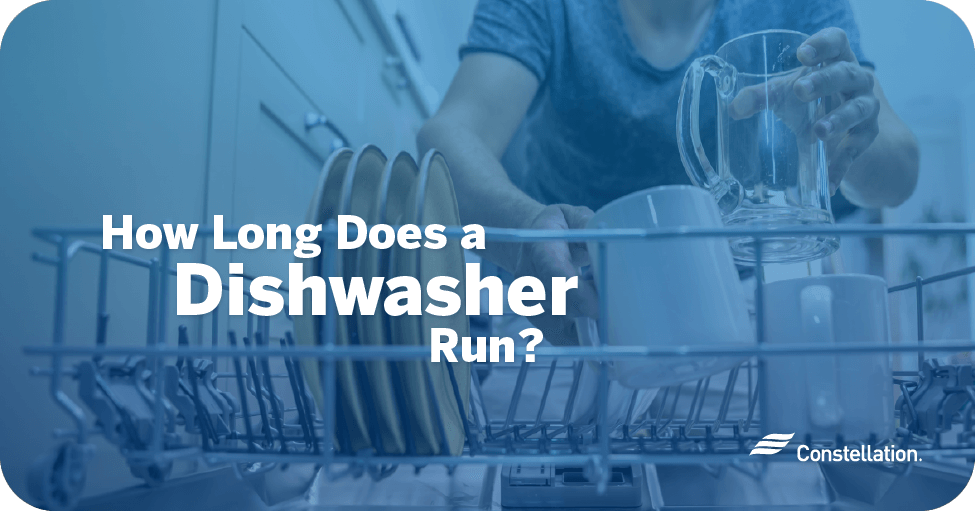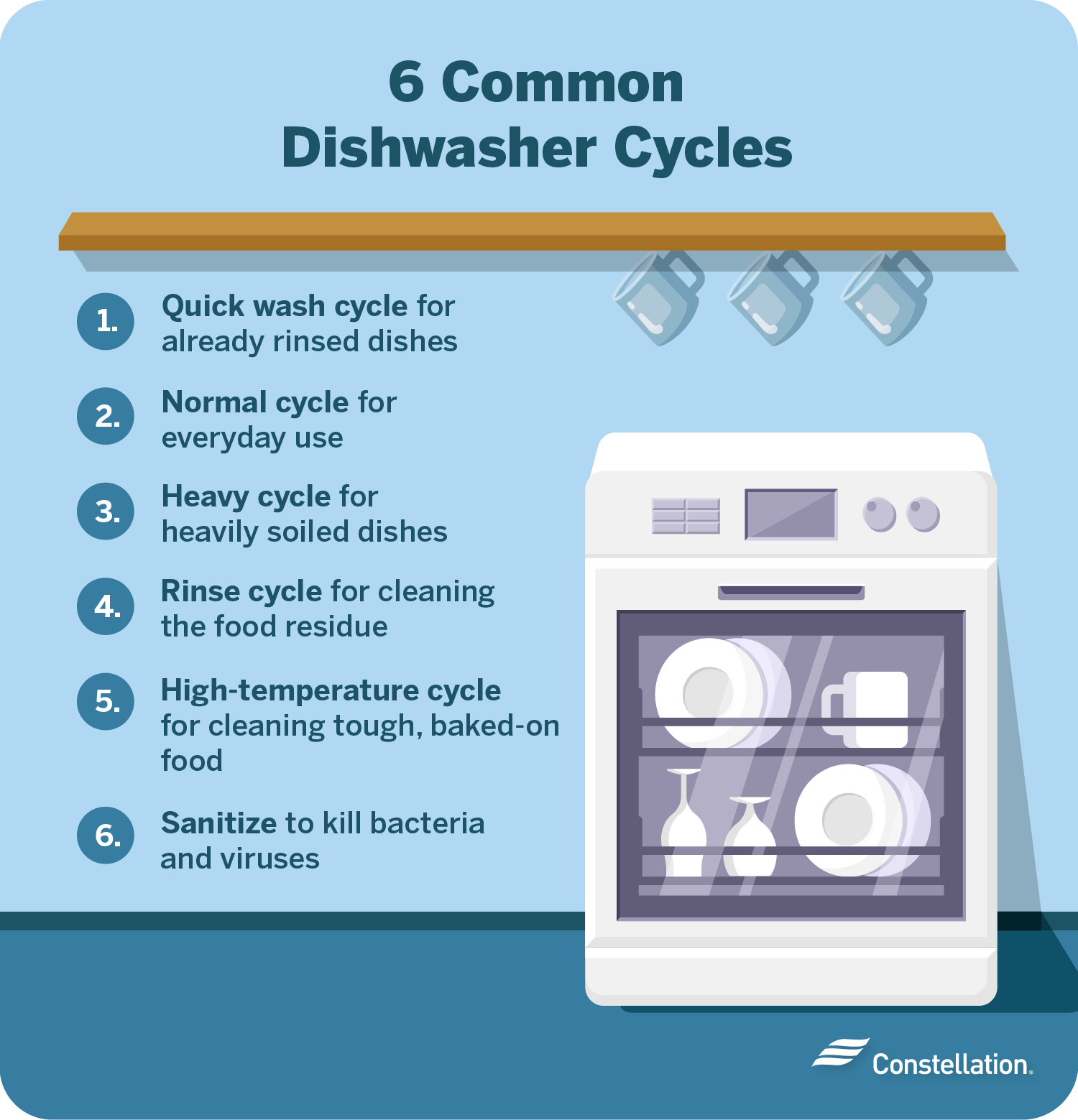
- Category:
Home Energy Savings -
Last updated:
October 31, 2022
How Long Does a Dishwasher Run and Why?
People often wonder how long a dishwasher runs and why their new dishwasher might be taking longer to get through a wash cycle than their old one. While there is no definitive answer, you can ensure your dishwasher runs efficiently by learning a bit about how your dishwasher works and how to shorten its run time when possible.
How long should a regular dishwasher run?
When thinking about how long a dishwasher should run and how you can conserve energy while getting your dishes clean, you need to consider the factors affecting dishwasher run time.
- Water temperature. Most dishwashers use 140°F water temperatures. Without this, your dishwasher will need to heat the water, and that will increase the energy it uses and its run time.
- Type of detergent. Liquid and gel detergents dissolve faster than pods and powders. Dissolving the powder in the dispenser in advance to speed the cycle.
- Water pressure. If you have low water pressure, it will take longer to fill the dishwasher making a normal dishwasher cycle take longer.
- Age and type of dishwasher. Older dishwashers may take a long time, but newer dishwashers are not necessarily faster. Energy-efficient dishwashers are designed to use less water and energy, but also have longer cycles.
- Size and type of load. It will take longer to wash a full load of heavily soiled dishes, than lightly used glassware.
- Cycle options. You can add a pre-rinse, double rinse at the end, and include heated drying, among other cycle options. Each additional function will add to the run time and to the energy used per wash cycle.
Why do new dishwashers take so long?
Changes to ENERGY STAR® standards issued in 2012 required new machines to use under 4.25 gallons of water in each cycle and to keep electricity usage below 295 kWh a year. To meet those standards, machines are reducing reliance on the water heater, instead using water straight from your hot water tank.
Since they cannot blast your dishes clean with high volume water jets, they need to extend the time your dishes are subjected to water to soften the dirt on your dishes in a method similar to soaking. They also may not get hot-enough water, meaning new machines run longer in economy mode with cooler water.
Some machines come with an auto cycle or smart wash cycle that detects the size of your load and how dirty it is. This cycle may last longer than expected if it senses the need.
How to troubleshoot a dishwasher that takes longer to run than it used to
Check your owner’s manual for guidance to answer the question: How long does a dishwasher run? It should tell you what to expect for each cycle. If you find your machine is running longer than suggested, check these areas
- Look for clogs and build-up. If you don’t rinse your dishes before loading them, the filter that keeps food scraps from clogging the drain may itself be clogged. You should also check the drain hose to make sure it doesn’t have gunk blocking water flow.
- Remove mineral deposits. If you have hard water, minerals like calcium carbonate, also called limescale, can clog the spray arms, build up on the heating element, and block drainage. You can usually scrub them clean, but special dishwasher cleaners can handle the task during a regular cycle.
- Inspect motors, belts, thermostats, and sensors. It could be that you have a mechanical or electrical problem that is causing your machine to run longer.
- Check the water temperature. If you don’t get hot enough water to your dishwasher, it will run longer as it burns energy to heat water for each cycle.
- See if you’ve added functions to your cycles. For example, adding a heated dry function to the cycle will extend dishwasher run time and energy usage.
6 common washing cycles of a dishwasher

An older standard dishwasher may have three basic cycles, such as quick-wash, normal, and heavy for soiled pots and pans. Today’s dishwashers have many more options. Answering how long a dishwasher runs will depend on which options you choose. A normal dishwasher cycle length will vary, too, depending on whether you add a pre-soak or heated dry into the run.
1. Quick wash cycle for already rinsed dishes
If you pre-rinse dishes and glassware, a quick wash may be all you need to remove grease and to sanitize them. This fast cycle takes less than an hour. It may use more energy, as it takes more water and heat to get the job done fast.
2. Normal cycle for everyday use
A normal dishwasher cycle can vary more than the name implies. Normal for one manufacturer could be different from a normal dishwasher cycle for another. Use this cycle for everyday washing of dishes that are not heavily soiled. Since this cycle is used by most people most often, manufacturers have optimized it to minimize energy and water usage. Modern dishwashers take between 2.5 and 3 hours to complete this cycle.
3. Heavy cycle for heavily soiled dishes
For heavily soiled and hard-to-clean items, this cycle is the best choice. It uses extra water, high pressure, and higher temperatures to get casseroles and pans clean. Some models come with a built-in hard food disposer that pulverizes food and minimizes the risk of clogs. All that power and convenience comes with higher energy use. It can take over four hours to complete.
4. Rinse cycle for cleaning the food residue
Rather than rinsing and pre-washing dishes in your sink, put gunked up dishes into your dishwasher for a pre-wash cycle. You may end up using less energy if you use this cycle to avoid having to run a heavy cycle.
5. High-temperature cycle for cleaning tough, baked-on food
For greasy residue and baked-on food, you may need to use a high-temperature cycle and an extra rinse to soften the gunk for more effective removal in the wash cycle. It will take longer and use much more energy than a normal cycle, but studies suggest that dishwashers are still more energy efficient than a human doing the scrubbing.
6. Sanitize to kill bacteria and viruses
This cycle uses very high temperatures in excess of 150°F to kill disease-causing microbes. These temperatures can be tough on your dishes–and your power bill–if you use it every day. Running it occasionally, such as once a month, will keep your dishes sanitary in addition to clean. If someone in your household is sick, consider using this cycle until they are clear of symptoms.
Common dishwasher usage questions
Using a dishwasher can seem straightforward, but many people have questions when it comes to minimizing how long a dishwasher should run or being energy efficient with the normal dishwasher cycle.
Which dishwasher cycle is the best to use?
There is no single best answer. You may use the normal dishwasher cycle by habit, however, you might want to adjust it for economy. The best cycle is the one that gets your dishes clean using the least amount of energy, using specialized cycles as needed.
Can you stop a dishwasher mid-cycle?
While you can stop a dishwasher mid-cycle, you should avoid doing so if you can. It takes more energy to restart and bring the heat back up. If you stop the cycle and add items after the detergent has been released, they may not get as clean. If you stop the cycle and leave it, detergent can dry and cake on your dishes. It all increases how long a dishwasher runs.
How often should you run your dishwasher?
The frequency of how often you should run your dishwasher depends on how often you collect a full load. You will be most efficient if you only run your dishwasher with a full load. And beyond a full load, you should learn how to properly load your dishwasher in a way that maximizes the amount of dishes you wash without them breaking, chipping, or falling on the heating element and melting. You should run it at least once a week to keep the seals and motor running well.
Why it pays to know your dishwasher run time and cycles
Understanding how long a dishwasher runs and the various cycles will help you make efficient decisions when using it. Using your appliances with care is one of the ways to save energy in your home.
Instead of habitually going with the normal dishwasher cycle and using more energy than you need, you can select eco-friendly options. And because it takes more energy to wash dishes twice, use the heavy duty options for heavily soiled dishes.
When buying a new dishwasher or using an older one, it is worth learning more about energy efficiency. And don’t hesitate to get a quote from Constellation on energy options for powering your home.




